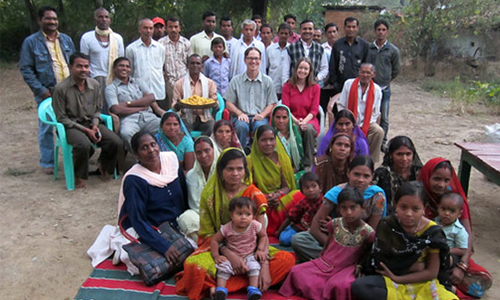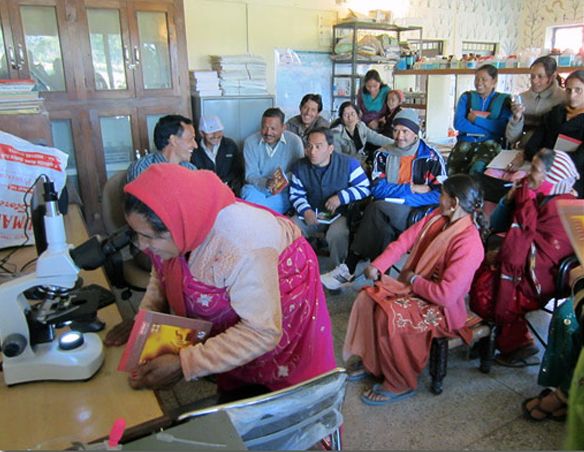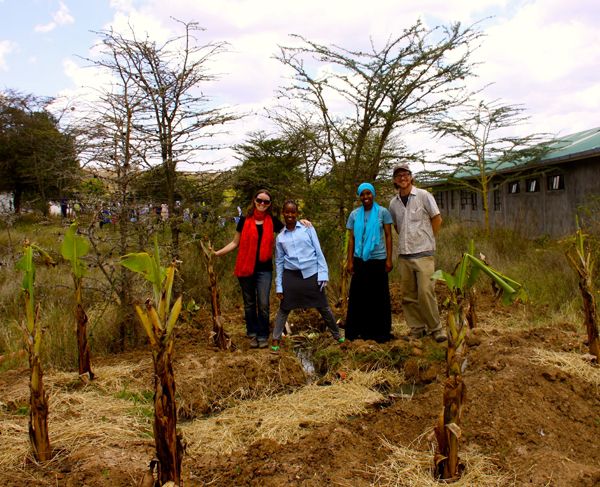
Vandana Shiva and Hummingbird Project Devoted to Saving Seeds and Restoring Soils

The couple also works in rural villages to examine farmers’ soils under microscopes to test the quality of the soils and teach specific organic methods for improving soil health. Farmers that have adopted chemical fertilizers and pesticides are shocked to find out that their soil samples have no biodiversity whatsoever. The goal of the Living Soil Saves Lives program is to help these farmers transition back to natural, organic farming methods. Since 2011, The Hummingbird Project has “presented on the ‘Living Soil’ to more than 2,500 individuals in six different states across India and has helped 12 farmers’ cooperatives by providing infrastructure such as water harvesting, irrigation and vermicompost systems.”
The nonprofit’s second program, the Sustainable Schools initiative empowers the school children, who McHugh and Kennedy worked with on their honeymoon in Kenya at Daraja Academy, to provide them with the educational tools necessary for them to become stewards of the land. McHugh and Kennedy have worked with students to design projects such as “biogas digestion to provide a source of clean, renewable cook fuel for the kitchen, greywater systems to recycle water to grow fruit and fodder trees in this semi-arid, equatorial region, a seed bank and an indigenous tree nursery to re-forest the degraded landscape surrounding the campus.” The initiative, which they plan to take to more schools in the region, aims to empower the next generation to adopt Mahatma Gandhi’s motto to “be the change you want to see in the world.”
The third program connects the Cleveland natives with their hometown. They started the Cleveland Seed Bank “as a response to the unprecedented loss of our planet’s biological diversity and alarming increase in multinational, corporate agriculture.” The seed bank has a physical and virtual presence. Through a partnership with the Cleveland Public Library, people can share seeds—same principles as the library, but with seeds. McHugh and Kennedy have also created an online site where growers can post what seeds they have and which ones they are looking for and then swap with other growers.
Saving seeds is something that farmers have done for centuries, but in the last century many seed varieties have become intellectual property through patents by corporations. Now 67 percent of the world’s proprietary seed (seed that has been patented) is owned by just 10 companies. The result of corporate control of our seed supply has been devastating to the world’s biodiversity and farmers’ self sufficiency. In the last century, 75 percent of plant genetic diversity has been lost due to farmers’ reliance on hybrid seeds, according to the UN’s Food and Agriculture Organization. Companies can now prohibit farmers from saving and replanting their seeds (and the hybridized versions don’t have viable seeds for the next season), thus requiring farmers to buy seeds each year from them. Seed libraries, on the other hand, give seeds out for free and simply request participants bring back seeds they harvested from their crop. Kennedy asserts that “seed saving is the next logical step in the local food movement” to reclaim control of our seeds and, ultimately, our food system.
But local seed libraries are under threat. Agribusiness interests have lobbied governments in Europe, the U.S., and elsewhere to prevent people from saving their seeds because there is a lot of money to be made in selling seeds. The Europe Union is considering tighter controls on seed saving with the belief that these restrictions would help ensure that farmers are getting viable seeds. But those against the proposed regulations argue that if they could save and breed their own seeds, they would be able to ensure their viability.
Kennedy and McHugh are concerned about the fate of the Cleveland Seed Bank. Last July, the Cumberland County Library in Mechanicsburg, Pennsylvania had to shut down its seed library because the Pennsylvania Department of Agriculture said it was in violation of the Seed Act of 2004. The act “primarily focuses on the selling of seeds, which the library was not doing,” but state officials were concerned “about seeds that may be mislabeled (purposefully or accidentally), the growth of invasive plant species, cross-pollination and poisonous plants.” The department told the library it could only have the seeds if staff tested each seed packet for quality, germination and other information.
That level of testing was beyond the scope of the library, which had partnered with the Cumberland County Commission for Women much like The Hummingbird Project partnered with the Cleveland Public Library. Most county commissioners thought the department had gone too far, but one county commissioner, Barbara Cross, believes seed libraries could pose a threat on a large scale. “Agri-terrorism is a very, very real scenario,” she said. “Protecting and maintaining the food sources of America is an overwhelming challenge … so you’ve got agri-tourism on one side and agri-terrorism on the other.”
Needless to say, The Hummingbird Project doesn’t see seed saving as an act of “agri-terrorism.” Just the opposite. To Kennedy and McHugh, giving a few multinational corporations control of our seed supply is the real threat. Saving seeds helps build resiliency at the community level to avoid the risk of disease wiping out an entire crop or the dangerous impacts of climate change.
Every state has laws requiring seed companies to be licensed, test seeds and properly label them. Some states require the licensing, testing and labeling only if you sell seeds, but other states such as Pennsylvania require these regulations even if you offer seeds for barter, exchange or trade. These laws exist because some farmers buy tens of thousands of seeds from seed companies, and they risk thousands of dollars if their seeds are not viable.
So the laws hold seed companies accountable, which is good, but proponents of seed libraries say they do not need state and federal regulation to ensure the viability of their seeds because they or their community members are saving the seeds from plants that they grew. “It’s hard to justify restricting the small-scale exchanges,” said John Torgrimson, the executive director of the Seed Savers Exchange. Nebraska, Iowa and Minnesota are among the states looking into shutting down their seed libraries.
Luckily, The Hummingbird Project and Navdanya are at work in the U.S., India and elsewhere to reclaim our right to our seeds. In an open letter to Prime Minister Modi and President Obama, Vandana Shiva calls on the leaders to serve the interest of the people and not corporations. Prime Minister Modi has invited President Obama to visit India on Jan. 26 to celebrate India’s day of independence. Invoking the principles of freedom both countries were founded on, Shiva calls on the leaders to end seed monopolies, “which have created an ecological crisis of biodiversity erosion, erosion of farmers’ rights and erosion of people’s freedoms.”
YOU MIGHT ALSO LIKE
Record Heat in Australia Fuels Wildfires, Shuts Down Internet
3 Ways a Republican-Controlled Congress Can Herald Action on Climate Change
The Solution Under Our Feet: How Regenerative Organic Agriculture Can Save the Planet

 233k
233k  41k
41k  Subscribe
Subscribe 

